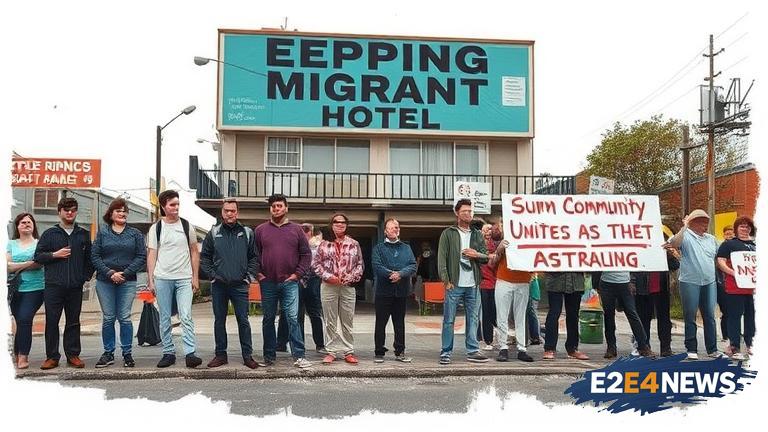A protest was held in Epping, UK, where residents expressed their discontent with the government’s decision to house asylum seekers at a local hotel, The Bell. The demonstration, which drew a significant crowd, highlighted the community’s concerns regarding the potential impact on public safety, local resources, and the overall character of the area. The protesters argued that the hotel’s conversion into a migrant accommodation facility would put a strain on already limited resources, including healthcare, education, and law enforcement. Furthermore, they expressed worries about the potential for increased crime rates and decreased quality of life. The protest was peaceful, with participants holding signs and banners to convey their message. Local business owners and residents alike were in attendance, emphasizing the importance of preserving the community’s identity and ensuring that the needs of existing residents are prioritized. The decision to house migrants at The Bell hotel has sparked a heated debate, with some arguing that it is a necessary measure to address the UK’s asylum seeker crisis, while others claim that it is an inappropriate use of resources. The UK government has faced criticism for its handling of asylum seeker accommodation, with many arguing that the current system is inadequate and in need of reform. The Epping protest is just one example of the growing discontent among communities across the UK, where residents are demanding greater transparency and consultation regarding migrant accommodation decisions. The protest organizers emphasized that their concerns are not driven by xenophobia or racism, but rather a desire to protect the interests of their community. They argued that the government must take a more nuanced approach to addressing the asylum seeker crisis, one that balances the needs of migrants with those of existing residents. The demonstration was attended by local councillors and MPs, who were urged to take the community’s concerns seriously and work towards finding alternative solutions. The Epping protest has sparked a wider conversation about the UK’s asylum seeker policy, with many calling for a more comprehensive and sustainable approach. The government has announced plans to review its asylum seeker accommodation strategy, but critics argue that more needs to be done to address the root causes of the crisis. In the meantime, communities like Epping will continue to feel the impact of migrant accommodation decisions, highlighting the need for greater collaboration and understanding between policymakers, residents, and migrant groups. The Epping protest serves as a reminder that the asylum seeker crisis is not just a national issue, but a local one, with real-world consequences for communities across the UK. As the debate continues, it is essential that policymakers prioritize the needs of both migrants and existing residents, working towards a solution that is fair, sustainable, and respectful of all parties involved. The UK government must also address the concerns of communities like Epping, providing greater transparency and consultation regarding migrant accommodation decisions. Ultimately, the Epping protest highlights the need for a more nuanced and comprehensive approach to addressing the asylum seeker crisis, one that balances the needs of all stakeholders and prioritizes the well-being of both migrants and existing residents. The protest has sparked a wider conversation about the importance of community engagement and participation in policymaking, emphasizing the need for greater collaboration and understanding between policymakers, residents, and migrant groups. As the UK continues to grapple with the asylum seeker crisis, it is essential that communities like Epping are heard and their concerns are taken seriously.
